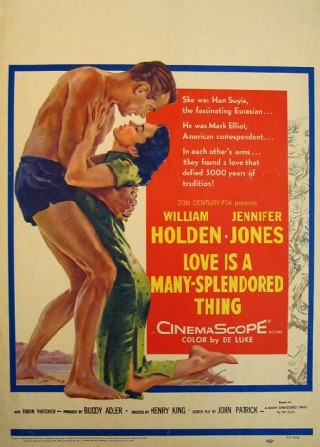
LOVE IS A MANY SPLENDORED THING
US, 1955, 102 minutes, Colour.
William Holden, Jennifer Jones, Torin Thatcher, Isobel Elsum, Murray Matheson, Virginia Gregg, Richard Loo, Philip Ahn.
Directed by Henry King.
Love is a Many Splendored Thing is almost one of the archetypal romance films. Made in Cinemascope, in the early years of Cinemascope, it is a lush romantic drama set in China. The occasion is the Chinese Civil War and William Holden plays an American war correspondent in Hong Kong. He is separated from his wife and encounters a Eurasian doctor, Han Suyin. (The film is based on the autobiographical novel by Han Suyin herself.)
The exotic locations, the atmosphere of romance, the wide screen and the Oscar-nominated song all contribute to the emotional response.
William Holden was a top star during the 1950s and won an Oscar in 1953 for Stalag 17. Jennifer Jones had emerged in the 1940s with an Oscar for The Song of Bernadette (also directed by Henry King).
The film is very much of its time – but is one of those romances that has lasted for more than fifty years.
1. What would audiences expect from the title? Its tone? Did it seem pretentious or solemn? A symbol? The illustration of the song and its theme?
2. The importance of Hong Kong and the atmosphere for the film? Hong Kong in the forties and fifties? Colour, widescreen? The use of the theme and the song?
3. How much realism was there in the plot? The fact that the story was semi-autobiographical? How romantically unreal did the plot seem? Or did the film blend realism and the romantic?
4. How typical of the Hollywood love stories was this film? Its lush presentation, the basic triteness of the theme, the use of sentiment? Did the film transcend these aspects?
5. The use of symbolism and the communication of the plot and the theme? The tree, the hill, the final vision of Mark?
6. How important was the presentation of 'East meets West'? The clash of cultures? The meeting of cultures? The repercussions on people's lives and emotions?
7. The race theme, Eurasians and prejudice? The effect on Han Suyin's life?
8. The war themes the precarious nature of war, precarious life and death, passing relationships, sudden endings, the suffering involved?
9, The film's presentation of themes of love and marriages the nature of true love, the furtive nature of an affair, the question of legalities and divorce, the formalism of marriage? What insight did Mark and Han Suyin's relationship give to these themes?
10. Han Suyin, how strong a character was she? The presentation of her in her work in the hospital, her self-consciousness as part eastern, part western, her serious approach to life, being transformed by her love for Mark, her visit to her family, her willingness to give her life for Mark? What insight into a loving woman?
11. The effect of sorrow on her life? Audience sympathy at the end?
12. How interesting a hero was Mark? Was he developed as a real character, or just a heroic figure in the conventional mould? What right did he have to fall in love with Suyin? The changing of his life? His going to war? The nature of his patriotism? The device of the letters? The impact of his death?
13. The contribution of the minor characters to the social life of Hong Kong, the Palmer-Joneses?, the people at the hospital; Suyin's friends and the contract with her; Suyin's family?
14. How important in this kind of film are the sequences like the operations, the parties, the swim, the walk on the hill etc.?
15. The film has a good reputation as an example of Hollywood love story. Is the reputation well deserved?